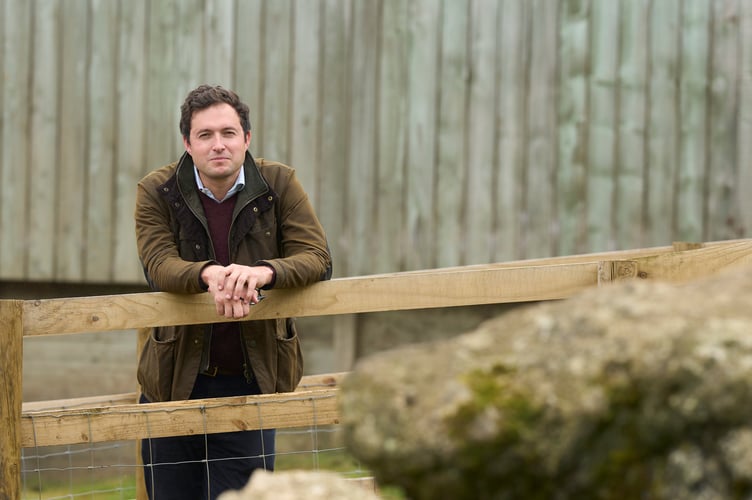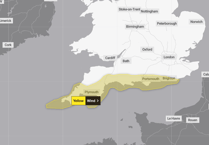Suella Braverman was out, David Cameron was back, and the Rwanda plan for illegal immigrants was deemed unlawful, it was only Wednesday morning. On a brisk morning in central London, MPs were to vote on whether to call for a ceasefire in Gaza and awaiting the supreme court’s judgement on the Rwanda plan, I was invited to speak to some of our local representatives in Westminster, about local issues and discuss the multitude of news from number 10 earlier in the week.
The winter sun brightened the impressive entrance hall in Portcullis House, shedding light on the ‘coffee shop’ conversations between MPs, advisers, researchers and journalists. The escalator leading to the halls of Westminster was akin to a conveyor belt of political ‘guess who’, with recognisable faces usually on the TV towing the party line appearing every 30 seconds. It was rather surreal finding myself sat down in the middle of the corridors of power.
I sat down here with Anthony Mangnall MP for the Totnes and soon-to-be South Devon constituency to talk about the government’s plans for dementia care and the work of Totnes Caring:
AM: “This is something the PM has made a key commitment to on making sure that social care is addressed in the level of funding in the NHS and that’s why you’ve got more funding in the NHS than we’ve ever had before its why we’re meeting the targets to get more nurses and more doctors, but you’re right adult social care is one of the biggest challenges that we’ve got as a country and as a society because population growth and birth rate are declining you’ve got an ageing population and people living longer and you know once you’ve passed the 65 age bracket you’re doubling the likelihood of suffering from something like dementia or Alzheimer’s every 5 years. One of the reasons I’ve done a dementia and Alzheimer’s course is to understand this better and how we can support it so yes there are certain resources there, but we also need to keep that model there working with the social care within the hospitals because that’s the way to do it. It’s good that we have the volunteer model and Totnes caring does great work and if I can help to promote their single to number 1 then we will do what we can, and I’ll certainly put it on my social media.
“One of the conferences I was at this week was the longevity forum and it was talking about how we age better and one of the speakers there was David Goodhart who wrote the book ‘anywheres and somewheres', he was making the argument how do we more for social care how do we do more for the carers themselves, lots of them are unpaid, lots of them are family members and lots of them are having to give up their job. So we do have to review that, we do have to think about how we support them in a better way, is there a pot of money that’s there for them, no, there are some allowances and grants out there to support them but we need to figure how we can join this up and how we can make sure that public, private and community is playing a role in this and addressing the issues that people face.”
In last week’s paper we published a piece about the issues surrounding the local housing allowance and the current broad rental market area for the South Hams, I raised this issue with Mr Mangnall and Sir Gary Streeter, MP for South West Devon, asking if they would lobby for changes to this in parliament:
AM: “Yes and yes, there’s a direct answer from a politician. Yes, on the boundaries because one of the biggest problems is the disparity in South Devon, we’ve got a lot of affluent areas, but we’ve also got huge amounts of rural poverty. A lot of our houses go to the short-term and holiday rent market rather than the long term which pushes the prices up. So, redrawing the boundaries and trying to be more specific to those areas is absolutely essential we’ve really got to consider that, of course I understand why you do a big regional viewpoint but we are in south Devon always at the mercy of regional targets. So for instance I think Devon county council says that the average salary in Devon is about 25,000-27,000, I wouldn’t say that matches up with the people I meet and it certainly wouldn’t match up with the people who are going to citizens advice and the job centre because their salaries are a lot lower and it means on the local housing allowance we are presenting a false picture as to what’s really going on in south Devon. In terms of the freeze, we’ve got the autumn statement coming up and I don’t know what’s in it yet, but we’ve got to be pragmatic about those things and make sure we are actually looking at ways in which we can supply housing for local people. It’s one of the reasons I’ve been pushing for a registration scheme for second homes and Airbnb its why we’re changing the tax threshold to get more money going to our councils and making sure that money goes straight back into helping people into houses and getting them the support, they need.”
AG: “Will you bring this up with the treasury?”
AM: “Of course I’ll talk to the treasury about this.”
GS: “We have a massive housing crisis in our area, it’s not just levels of rent, also the volume of property is simply not there to meet the demand. So, I am certainly in support of the LHA being increased to get somewhere near market rents in the South Hams, that’s got to happen. But I think we’ve got to do a lot more to tackle the housing market and its partly to do with the reforms George Osbourne introduced some years ago to how private landlords if they’ve got a mortgage can or cannot set that off against the rental income. I’ve been lobbying Jeremy Hunt for some time to make some changes to the way in which landlords are treated by the treasury at the moment, because lots of them are leaving the market for all sorts of reasons, leading to demand outstripping supply. So, action is necessary LHA is one of them, but that alone won’t do it.
AG: “And what about the BRMA’s?”
GS: “Yes it probably should. I think that Plympton, Plymstock and the South Hams is very different to North Hill. I think it does need a revamp.
AG: “Will you bring this up with the Treasury?”
GS: “Yes absolutely, because people are being squeezed out of the rental market and its causing untold misery.”

Later in the day I made my way down to the ministerial offices, their wide corridors were adorned with hundreds of years’ worth of books on nearly anything you could think of. The vast wooden doors displayed a small train ticket sized card saying whose office it was and their role in the government. I was there to talk to the minister for Veterans Affairs, Johnny Mercer MP, about remembrance weekend and its significance in the UK and here in Devon:
JM: “Remembrance is really important because obviously it’s very important we do it every year to remember the sacrifice to those who gave their lives but also it’s about the position of veterans in the nations consciousness and how we get the nation to a place where it properly looks after her veterans and we don’t just remember but in the act of remembrance we think about what it actually feels like to be a veteran in this country today.
AG: “Why is it important we see members of the armed forces out in their uniforms on remembrance weekend?”
JM: “Its hugely important, I think for a lot of people and communities the military can be in some ways quite intangible and untouchable because there’s not a base in their community and so I think it’s important we show what the military does, and that people have a chance to chat to people in the military. I think that our people are our finest asset, I’ve always said that, and the idea of members of the public meeting serving personnel and being inspired by their service and inspire themselves to join.”
His office neighbour was Robert Jenrick, Minister for Immigration, I introduced myself to him when he made his way out of his office and asked what next for the Rwanda plan, he replied: “we’ll keep fighting for it”. I guess we will see how that plays out in the coming weeks.
Mr Streeter spoke about his pride in Ivybridge’s remembrance parade and memorials: “It does give me a lot of pride. I feel that acknowledging the sacrifice that these people have made in war is very important and great to see that young people do attend these services. When you drive into Ivybridge and see the garden of remembrance next to the roundabout, it always gives me a thrill to see it, its nearly always well maintained and well looked after. Ivybridge town council does these things well and I pay tribute to that.”
Mr Streeter is one of the most experienced politicians in the House of Commons, representing the people of Plymouth and the South Hams since 1992. He invited me into his office where we sat down to talk about his time in politics his thoughts on the most recent reshuffle over a cup of coffee. Earlier in the week Prime Minister Rishi Sunak had ground Westminster to a halt with the announcement that David Cameron would be coming back into frontline politics as his Foreign Secretary. I asked Anthony and Gary for their thoughts on Mr Cameron’s return.
GS: “It was a surprise. We are in troubling global times and bringing back a heavyweight as foreign secretary is a very smart thing to do. If you think about what’s going on in the middle east, Russia and Ukraine, and the tensions between China and Taiwan, why wouldn’t you want one of your big hitters to come back and help, so I think that’s a smart move.”
AG: “Was Rishi right to get rid of Suella Braverman?”
GS: “I think it was a very marginal call, it was a really difficult decision because I think she’s going to go out and cause a sacks full of trouble. It wasn’t so much the policies that we were pursuing under her that were wrong it was the tone. As leaders we have a responsibility to create a framework in which everyone feels valued and we don’t set one faction against another and I’m afraid that wasn’t her greatest skill, her greatest skill seemed to be slightly over the top with her language and it was inflammatory. I think on balance glad she’s gone but she’s going to cause trouble and I hope we zone out noise that’s from her and focus on what rishi is going to deliver.”
AG: “Was it deliberate?”
GS: “I think there’s something in that. Get sacked and become the princess over the water, lined up for when we lose the next election, I guess she would want us to lose the next election and become our leader. If that’s the case, then quite a few of us might not be renewing our membership.”
AG: “Do you agree with her letter?”
GS: “No. Not at all, I think Rishi Sunak has inherited a difficult situation, he’s a very smart man he’s got vision, passion and conviction and already he’s starting to deliver.”

I got immediate reactions to the decision of the supreme court that the Rwanda plan was unlawful from Mr Streeter and Mr Mangnall, with both supporting the plan and the efforts to get it through parliament:
AM: “Well there are other mechanisms which you can take on, I think we have to be statesmen about this, we have to do statecraft, the convention on refugees was written in 1951, it talks about the first safe countries that’s clearly not happening, people travel through Europe and then apply for residency or migrancy status in the UK, well they can do that in Europe and I think you need to modernise these things rather than leave them, leaving things because they don’t do what you want, well you don’t become part of the UN, become part of the WTO or NATO. We have to remember collective responsibility means sacrifices in certain areas. So, what we need to do is what the PM is doing and create relationships with European leaders about how we address these issues.”
AG: “Will you call for UK to leave ECHR?”
GS: “I won’t be calling for it, but I will support it if it’s the only way forward. We have to put in place a deterrent to stop the boats coming over and if we can’t do that under the current legal framework, we helped set up the ECHR for a very different purpose, what we’re talking about now is a legitimately elected government putting in place policy I think supported by the majority of its people.”
AM: “I think that it’s a very sensible move, because we don’t use ex-PM’s particularly well, although I wouldn’t advocate using Liz Truss for anything, but David Cameron was a phenomenally good politician, he was internationally respected, he was someone who pushed a global agenda around climate change, he was someone who understood the importance of international development and foreign aid, he was someone who built relationships around the world. I think actually having a PM sitting idle at 57 is not a very good use of time so I think that this is a very sensible move and it allows the PM the bandwith to say well I’m comfortable with my foreign policy being worked on by someone who understands the mechanisms and the politics, who understands the PM and can go out and do this stuff, so he can focus on doing what he’s promised to do, like today he has met his target to halve inflation.
AG: “But he's unelected?”
AM: “It’s a fair criticism but it’s not really a justified one, because this is exactly what happened when peter Mandelson came back in, its exactly what happened when Lord Carrington came in, are we really saying that we shouldn’t have people who are brilliant at what they do put into the House of Lords, I’m an advocate for the house of lords because you have some of the most fantastic scientists, lawyers, accountants, and philosophers who are scrutinising legislation. So, I don’t think there is a problem of appointing people to cabinet roles if they’re going to be good at their jobs and they’re going to deliver. Do I want to make sure there is political accountability, of course I do and there is political accountability in the lords, and he’s also got a deputy in the house of commons in Andrew Mitchell. So as far as I can see you’ve got a foreign secretary who’s readily available for people to go and see him and go to select committees which he can still go to, there is a precedent. This has happened throughout Labour party government, this isn’t anything different and frankly if this I going to put Britain back onto its global footing, then I think this is a good thing.
AG: “Was Rishi right to get rid of Braverman?”
AM: “Yes. You have to have collective responsibility, if you want to set up a government, if you want to run it well, then you have to make sure people are singing from the same hymn sheet, that they’re doing the same things that are on the PM’s agenda, it’s the PM leading this country not Suella Braverman, so yes, he’s right to do that. I’m afraid one of the things you have to be careful about in this job is language, I don’t agree with what Suella Braverman said about homeless people and sleeping in tents being a lifestyle choice, I think that’s an idiotic perspective and shows someone who has been out of touch on this issue.”
AG: “What did you think about her letter?”
AM: “I don’t think she wrote it; I think she had someone else write it. She is entitled to her opinion and to make these points clear but what we are already seeing is a PM who has made his pledges very clear, she’s obviously aggrieved because she’s been sacked.”
AG: “Was her article in The Times a deliberate attempt to get sacked?”
AM: “I think that’s mad because I don’t think she has the support in the parliamentary party to do that. I think it would be ludicrous to try and change leader, I think the PM has a wealth of support from people.”
On a week where the Westminster circus was on full show, a cabinet reshuffle, an ex-Prime minister returning and the Supreme Court deciding to rule against the government, it couldn’t have been a better week to report from Westminster for the South Hams Gazette.




